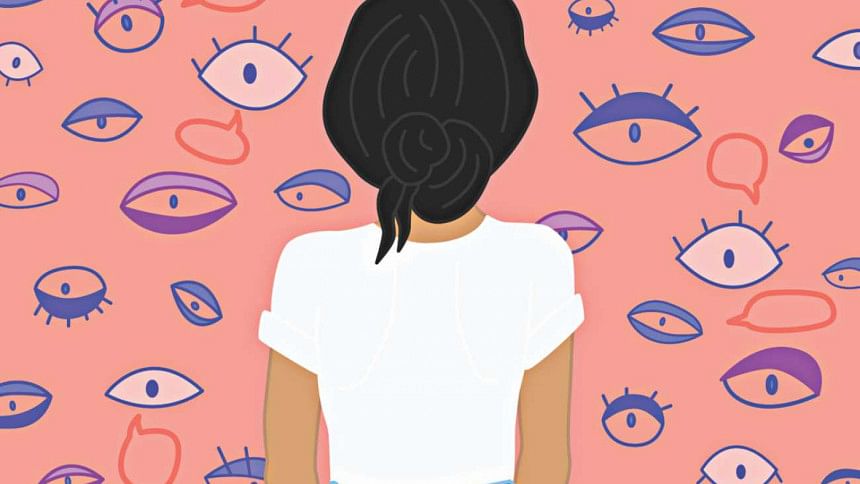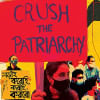The burden of guilt

So much has been said and written about sexual harassment of late. Much of it attributed to sexual harassment on campuses of colleges and universities, particularly in North America, and left the voice of the abused in silence. In all these writings, less has been said about the hyper-sexualised society where we often overlook the importance of consent when it comes to sexual behaviour. Thoughts get tangled in trying to analyse on whom does the blame of such abuses lie.
The shame, stigma, fear of retribution and judgment by friends and strangers alike, all contribute to the fog that inhibits a victim's ability to process the abuse. I know this because it is precisely this fog, which has led me to share and try to articulate my own experience of sexual harassment.
My own, recent experience of being sexually harassed at a university is not unlike that of many others. Indeed, I suspect my reaction, my inability to process, focus and articulate my thoughts on the subject are shared by hundreds, perhaps thousands of other students in campuses across the world. I also suspect there are but very few women who have not been the subject of sexual harassment at colleges and universities.
Perhaps the most difficult aspect of my experience is to process the culture of victim-blaming that followed my sexual harassment. Victim-blaming is both intentionally and unintentionally embedded in our society, especially where the victim is a female. As a foreign student, I recently graduated from a university in a country where the culture and environment were supposed to nurture peace and compassion. However, the "perfect utopia" turned out to be my worst nightmare.
***
Shortly after starting the new academic term, a friend and I accepted an invitation to lunch, where we were sexually harassed by a fellow classmate. My experience of victim-blaming came in many forms. In the form of other students insensitively asking questions like "why?". It came in the form of people sending well-intentioned messages of support, but wrongly assuming incorrect facts about the incident. Assumptions drawn largely from over-active imaginations and misguided ideas about what represents acts of sexual harassment. It came in the form of curiosity: "what dress were you wearing that day?"
Continued victim-blaming came in the form of having to endure forensic psychiatric assessment tests, conducted apparently to prove we were mentally stable and not lying about the incident. The test required us to answer more than 500 questions, mostly personal in nature—relationships, sexual orientation, alcohol consumption, etc.—all in an effort to prove our credibility and mental sanity.
Victim-blaming did not end with such intrusive tests. Rather, it continued to follow a trail where lawyers wanted us to prove, six months after the incident, that it did indeed happen and our stories corroborated. I assumed, albeit wrongly, that all this would lead down a path where I would find empathy and due compassion for my traumatic experience. Instead, I was repeatedly forced to relive the shock and trauma of the incident to prove my innocence.
It almost took me a year to say out loud that, yes, I was afraid; I was ashamed of the feeling that someone touched me without my consent. It took me a year to say, the feeling of being touched by another person without my consent made me fear any kind of physical contact. I was scared to go out of my house every single day to face people and be judged by others for an incident I did not have control over. It took me a year to realise it was not my fault that I had undergone such an experience—if it was not me or my friend it could have been someone else. A year of mistrusting my own feelings and thoughts almost made me feel like being alive without a soul.
All these feelings were attributed because as a victim you are doubted, mistrusted and subjected to having your integrity questioned. Perhaps, I should have put more thought into the idea of going for lunch with a fellow student, or perhaps I should have found my own path for dealing with the incident instead of seeking help. Rather than the perpetrator, it is I who feel the guilt; I shoulder the burden of going through such an experience.
The burden of guilt is mine, and mine alone. Society neither bares, nor shares responsibility for such guilt. My voice has got lost somewhere amongst the noise of people discussing my personal life, appropriating blame, trying to make sense of an incident they know little about.
Schedules are prepared, appointments made and scripts distributed detailing how you are to behave after you have been sexually harassed. They will tell you how much you are allowed to cry; how much you can, and possibly should react. You are told how much you are allowed to be scared, or how much you can speak for yourself.
Any performance outside the script would make you an outcast and you would be ridiculed for it.
The truth, my truth, much like my voice, is also getting lost. My truth is questioned, endlessly. My feelings are no longer my own, rather the feelings of others telling me how I should feel.
The perpetrator of course avoids such intrusions. He can flee or choose not to participate in the legal process by other means. Is it any wonder why so many victims remain silent after such experiences?
Our university preached about its zero-tolerance approach to incidents of sexual harassment, yet proved to be unprepared to handle such cases. Does the "process" of victim-blaming contribute to a system where the perpetrators are given the benefit of the doubt or escape punishment; where victims have to prove their innocence?
We failed over and over again to affirm that consent is the key in engaging in sexual acts of any sort. Every individual has the right over his or her own body. Every individual has the right to say "no".
Doesn't every victim have the right to be believed? To be heard, to be treated with dignity, and to seek justice?
It does not matter what you wear, what your level of alcohol consumption is, how many friends you were with, what your sexual orientation is, or how frequently you engage in sexual relationships; these are personal choices. They don't excuse unwanted attention or sexual harassment.
We need to focus on the victim: on the process of validation and on the process of healing. There needs to be a focus on improved support structures and safe, confidential spaces where there is no judgment and no guilt. Victims should get to decide the time, place and space to be heard, to communicate. My healing process started through the support of a small group who neither asked nor pressurised me to share, but supported me throughout the time by being there in silence, and bestowing love, support and care; by finding small moments to assure that with them I have a safe place to live, breathe and shine.
The writer is a graduate student.
* Pseudonym

 For all latest news, follow The Daily Star's Google News channel.
For all latest news, follow The Daily Star's Google News channel. 








Comments